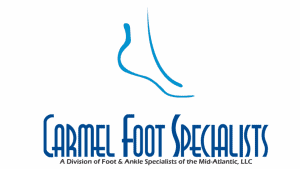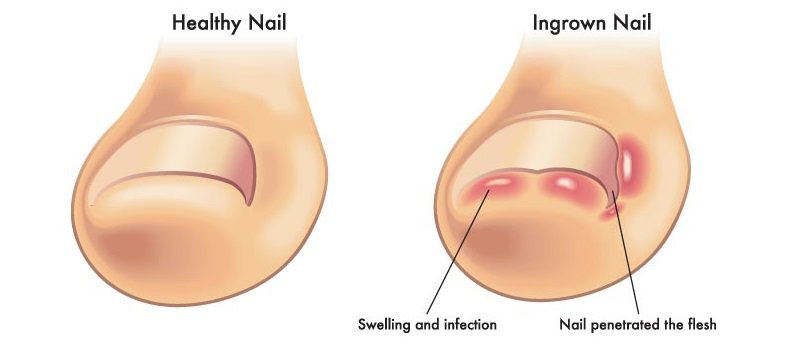

Podiatrists in
Charlotte, NC (Pineville)
Languages
- English
| Monday | 8:00 AM - 4:00 PM |
| Tuesday | 8:00 AM - 5:30 PM |
| Wednesday | 8:00 AM - 4:00 PM |
| Thursday | 8:00 AM - 4:00 PM |
| Friday | 8:00 AM - 12:00 PM |
- General Info
- Our Doctors
- Achilles Tendinitis
- Ankle Fractures
- Ankle Sprains
- Ankle Strain
- Arthritis
- Bunions
- Corns & Calluses
- Diabetic Foot Treatments
- Flat Feet
- Fungal Nails
- Ganglions
- Gout
- Hammertoes
- Heel Pain
- Ingrown Toenail Treatments
- Laser Nail Treatment
- MLS Laser Therapy
- Nail Problems
- Neuromas
- Orthotics
- Peripheral Neuropathy
- Plantar Fasciitis
- Plantar Warts
- Sports Injury
- Carmel Foot Specialists
-
Affiliated Locations
Nail Problems
Healthy, clear toenails aren’t just a luxury, or something pretty to show off in open-toed shoes! Your nails do lots of important things, like protect your toes from injury and infection, and even provide counter-pressure to help with balance. They even can provide a “window” into your overall health.
… and, of course, they also can be a source of beauty, pride, and self-esteem!
Unfortunately, toenails (or the nail bed underneath them) can easily get bruised, damaged, or even infected. The results can be painful, embarrassing, unsightly, or all the above!
Fortunately, Carmel Foot Specialists offers effective medical treatments for many common nail problems—just as our sister spa, The Foot & Body Boutique, offers aesthetic treatments!
Let’s learn a little more about some of the most common nail problems we see.
Ingrown Nails:
We cover ingrown nails comprehensively on our dedicated service page.
An ingrown toenail occurs when the corner or edge of a nail grows into the skin that surrounds it, rather than growing normally. There are several possible causes, including wearing tight shoes, trimming toenails too short, or accidental injuries. However, if you tend to get ingrown toenails regularly, the most likely reason is an inherited nail deformity.
Obvious symptoms include redness, swelling, and sometimes intense pain. If it becomes infected, you may notice pus or discharge. Discomfort may occur anywhere from the tip of the toe to the base of the nail, and may be worse while walking or wearing shoes.
Treatment options vary based on how severe the ingrown toenail is, whether they are a recurring problem, whether an infection is present, or whether you have a potentially complicated condition such as diabetes.
If you do have diabetes or an infection, please contact our office immediately.
In most cases, we will recommend a procedure to remove the part of the nail causing problems. This may be combined with a second procedure to prevent this same part of the nail from growing back. Pain is usually fairly minimal, and you can return to normal activities within a day or two in most cases.
Fungal Toenails:
We cover fungal toenails comprehensively on our dedicated service page.
Toenail fungus is caused by a group of fungi known as dermatophytes, which are also known to cause skin infections such as athlete’s foot. Common symptoms include thickened, crumbling, or even distorted nails, as well as yellowish or grayish discoloration. It may have spread from your skin to your toes, or you may have picked it up walking barefoot in public facilities, or by frequently wearing damp, sweaty shoes.
Severe fungal toenails are definitely unsightly, and can also be painful and spread to other nails, your skin, or others. And they don’t go away on their own—ever.
Fortunately, our office is now offering laser treatment as a modern, much-improved solution to this stubborn and embarrassing problem. This option has the advantage of being fast, convenient, free from side effects, and effective in a significant majority of cases. It may be combined with more traditional forms of treatment, such as oral or topical antifungal medications, if it is safe to take them.
Because of the nature of fungal nails, it will take several months before the damaged portion of the nail grows out and you see optimal results. However, those who want an immediate aesthetic improvement should consider KeryFlex nail restoration from the Foot & Body Boutique.
Thickened Toenails:
Fungal toenails are one possible cause of thickened toenails, but there are several other possibilities. Other causes and contributing factors may include:
- Diabetes
- Psoriasis
- Vascular disease
- Accidental injuries
Thickened nails are more than just a visual nuisance, especially if they are caused by a systemic problem. They can also lead to infections or ulcerations of the underlying nail bed if they are severe.
If your toenails become so thick that they are unsightly, or even difficult to trim safely, we may be able to help you trim, file, or thin them. We’ll also carefully examine your condition to determine if there are any underlying medical conditions that need to be treated.
Black and Blue Toenails:
The most common cause of black and blue toenails is repetitive injury to the nail, which leads to bruising of blood vessels and pooling blood under the nail. (Other terms for this condition include black toenails and subungual hematoma.)
You might be more prone to developing a black toenail if:
- You are a runner or play sports with lots of running or stopping.
- Your shoes are the wrong size—too large or too small.
- You injured a toenail (such as by dropping an object on it or stubbing it).
Treatment will depend on the severity of the condition. We’ll talk with you about your symptoms and physical activities. We’ll also examine the toenail to determine if there are more severe problems, such as a fractured toe, bone spur, or infection.
Some cases may go away on their own with rest. In more severe instances, we may need to remove the nail or drill a hole into it to drain the fluid or treat an underlying injury. The nail may or may not fall off on its own, anyway.
If you notice a black spot under the nail, we strongly encourage you to come see us. While it is most likely a bruise or cut, there is a small chance you may have developed melanoma. This cancer can be deadly if not caught early, so you’re much better safe than sorry.
Something Else?
As mentioned in the introduction, your toenails can often provide a “window” into your overall health. These can include early warning signs of systemic conditions such as diabetes, COPD, anemia, coronary disease, dietary deficiencies, and much more.
If you ever notice a problem with your toenails—pitting, ridges, depressions, discoloration, thin lines, raggedness, etc.—don’t panic, but also don’t ignore it, either! It is always best to get such things checked out, at least for your peace of mind. Not only can we help you restore a healthy appearance to your nails (and quite possibly prevent an infection), but we may help you catch and treat a more serious condition, too!
If you have any of the common nail problems listed above, or a nail problem that you don’t recognize, give us a call or fill out our contact form to request an appointment. You can reach our offices at the numbers listed below.
Myers Park: (704) 334-8682
South Charlotte: (704) 542-8253




